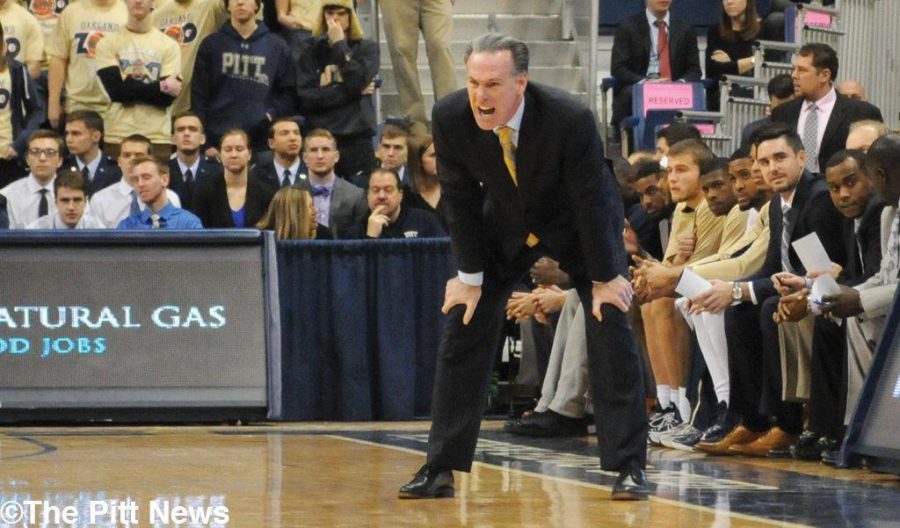Heartbreak a perpetual constant of late for Pitt basketball
January 12, 2015
Academics, party life, location and tuition are just a few factors that teenagers consider when choosing a college or university. Although I took all of these into account, Panther basketball was also a major reason I chose Pitt.
As a freshman, I couldn’t wait to rep blue and gold, heckle opposing teams and rattle the Pete as a part of the Oakland Zoo. I fiercely anticipated watching the Panthers take the bright orange court of Madison Square Garden, fighting to the top in the Big East tournament.
I’m halfway through my junior year now, and I have quite the collection of happy memories of supporting the blue and gold.
I’ve got to admit, though, Pitt basketball hasn’t quite met my expectations.
I first saw former center Steven Adams during the first class of my first day at Pitt in 2012. To many in class, he was probably just a super-tall guy trying to fit into one of the Cathedral’s many miniscule seats. The basketball geek in me knew that he was the five-star recruit from New Zealand who would be the heart of the Panthers basketball team that year. He would be the guy who would rebound, block every shot and anchor the team’s blue-collar, hard-nosed defense. He would allow the Panthers to wreak havoc against teams and win a whole lot of games.
The Panthers did end up winning a lot of games that year. With a mix of highly touted freshmen and experienced players, they beat some good teams, including Cincinnati and Syracuse, during the regular season.
The Pitt offense sometimes couldn’t catch up with the defense, however, and the Panthers couldn’t shoot the ball consistently from the perimeter. The Panthers made the NCAA Tournament, but they lost to Wichita State in the first round by 18 points — a disappointing end to what had seemed like a promising season.
Perhaps I thought the season was disappointing because my expectations for the team were too high. Adams had never played organized basketball in the States before coming to Pitt, and the team didn’t have any great scorers. Maybe I could have foreseen their shortcomings. Still, if you look at past Pitt basketball seasons, you’ll see a common trend — the Pitt basketball team always falls just short in the biggest games.
Start with the 2008-2009 season: Many considered the Panthers the best team in college basketball during the regular season, and the team was a No. 1 seed in the NCAA Tournament. However, Scottie Reynolds and the No. 3 Villanova Wildcats left Pitt heartbroken in the final seconds.
The Panthers were a No. 3 seed in the 2010 NCAA Tournament after another successful regular season. They lost to No. 6 Xavier in the second round by three points. In the 2010-2011 season, the team was consistently ranked in the top five in the AP Top 25. Even so, Cardiac Kemba and the Huskies shocked the Panthers in the Big East Tournament at the buzzer, and the Panthers were stunned by No. 8 seed Butler in the final seconds of a second round game in the NCAA Tournament.
Last year was also promising, and it seemed like the team had turned things around after they blew out Colorado in the first round of the NCAA Tournament. Yet, they then fell to the top-seeded Florida in the second round.
It isn’t a fluke that the Panthers lose in big games, because it happens so often. A taste of success is only a taste, and it is nothing the team can savor. There has to be a reason why this keeps happening.
Perhaps it’s just the team’s style of play. Jamie Dixon places a significant emphasis on defense, and the team plays hard on that end. But, as we’ve seen from recent NCAA tournaments, dynamic guard play and good shooting are necessary components of championship teams. During the past three years, Pitt hasn’t had a good combination of these components.
Perhaps I set my expectations too high and didn’t look deep enough into Pitt’s past to realize that heartbreak was a common thread throughout an otherwise successful string of years. Maybe I overestimated the program based on its high win totals and top seeds, ignoring some of the issues that would eventually plague the team over the next few years.
From 2008 to 2011, the Panthers did have good guard play and shooting, so there has to be another reason why the team consistently lost close games. Maybe the teams just weren’t mentally tough enough. Perhaps there’s something about the team’s coaching or players that causes them to crumble under pressure. Maybe it isn’t the style of play or a lack of mental toughness at all. Maybe it’s just luck. They’ve lost close games that could have gone either way, and, I guess, it’s possible that maybe the team is unlucky enough that the ball never rolls its way.








